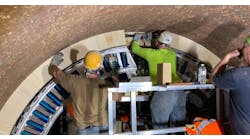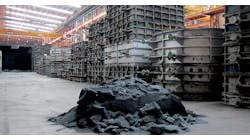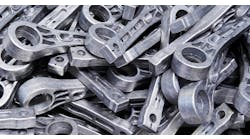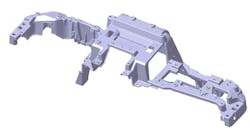Meridian Magnesium Products of America has committed to rebuild its magnesium diecasting complex in Eaton Rapids, MI, following a series of explosions and a fire earlier this month that left the automotive parts plant largely out of service. The plant is one of the North American auto industry’s largest suppliers of lightweight structural parts — engine cradles, front-end carriers, instrument panel crossbeams, liftgate inner structures, and radiator supports — and the incident has disrupted the supply chain for various product lines.
Meridian Magnesium’s Eaton Rapids plant is a 208,000-sq.ft. operation that started up in 1994. It produces about 13,140 metric tons/year of magnesium diecastings, according to the company website. It’s one of four North American plants for Meridian Lightweight Technologies, a subsidiary of Wanfeng Auto Holdings Group, headquartered in Xinchang, China.
The northern part of the Eaton Rapids plant reportedly was destroyed by the explosions and fire on May 2, though some parts of the complex remain in operating condition.
Ford Motor Co., which reportedly receives about one third of the plant’s output, suspended production of its F-150 and F-Series Super Duty pickup trucks at plants in Kansas City, MO; Dearborn, MI; and Louisville, KY, due to the interruption. The plant also supplies components for the Ford Explorer and Flex and the Lincoln MKT products.
Ford is expected to resume its scheduled production this week.
General Motors temporarily halted production of GMC Savana and Chevrolet Express full-size vans at Wentzville, MO.
Fiat Chrysler acknowledged some disruption to production of the Chrysler Pacifica minivan at Windsor, ON. BMW reportedly canceled some production shifts for its plant at Spartanburg, SC, where is produces the X5 and X6; and Mercedes-Benz reportedly canceled some shifts at its Tuscaloosa County, AL, plant due to a parts shortage.
The May 2 incident happened during the overnight shift. About 150 people were evacuated from the plant, but just two were hospitalized with minor injuries, and then released.
The cause of the explosion has not been announced. Magnesium alloys are highly flammable, and molten magnesium can be highly volatile if it contacts water. Magnesium manufacturing operations generally observe strict production standards and safety procedures, to guard against the possibility of explosion.
“The immediate goals for the Meridian team are to perform building and machine repairs, and to return to normal operations,” the plant’s general manager George Asher wrote in a statement.









